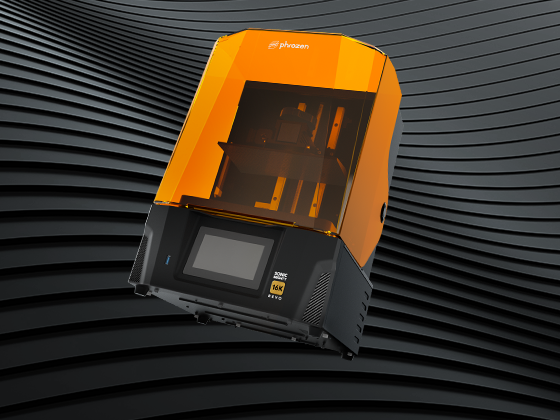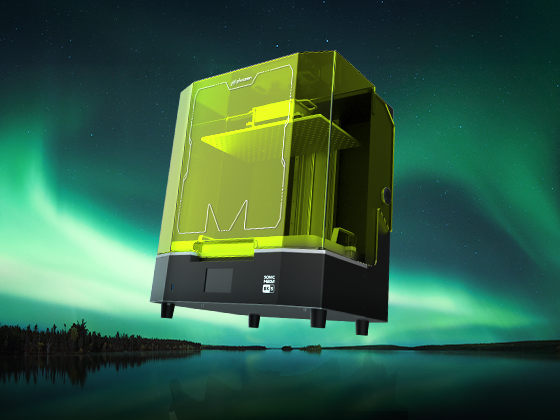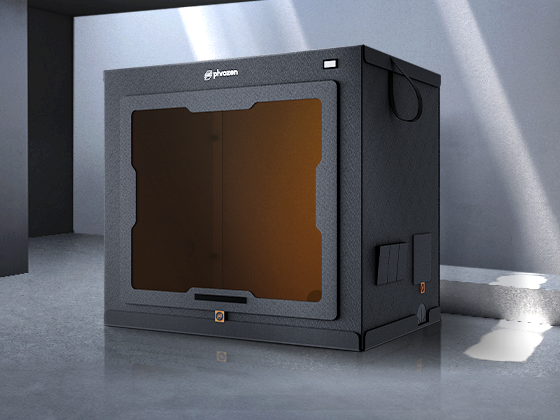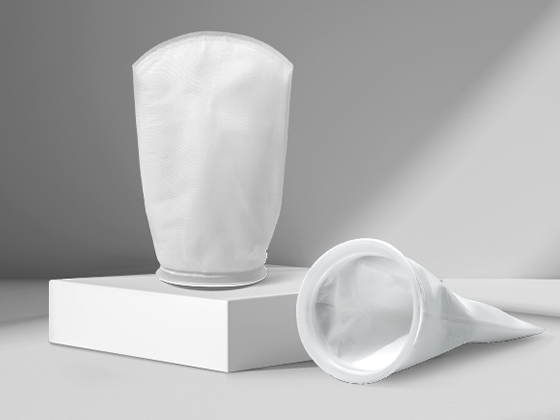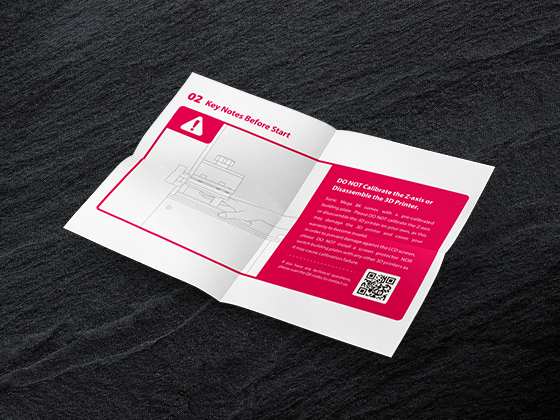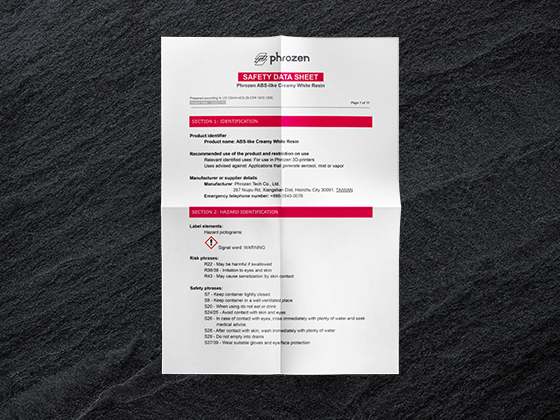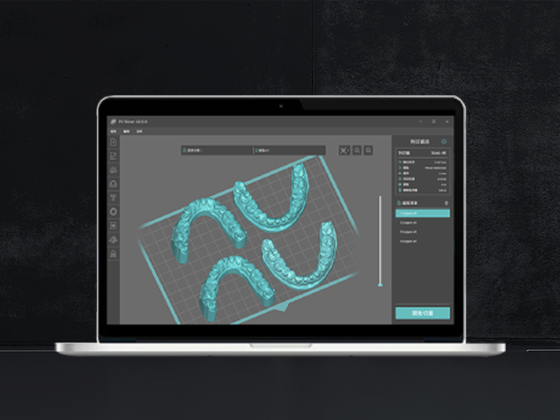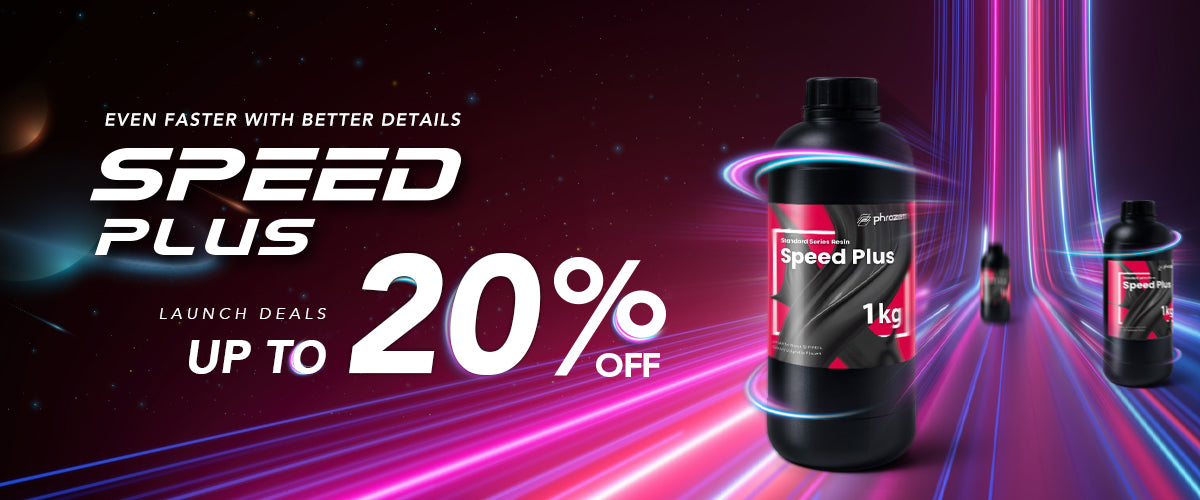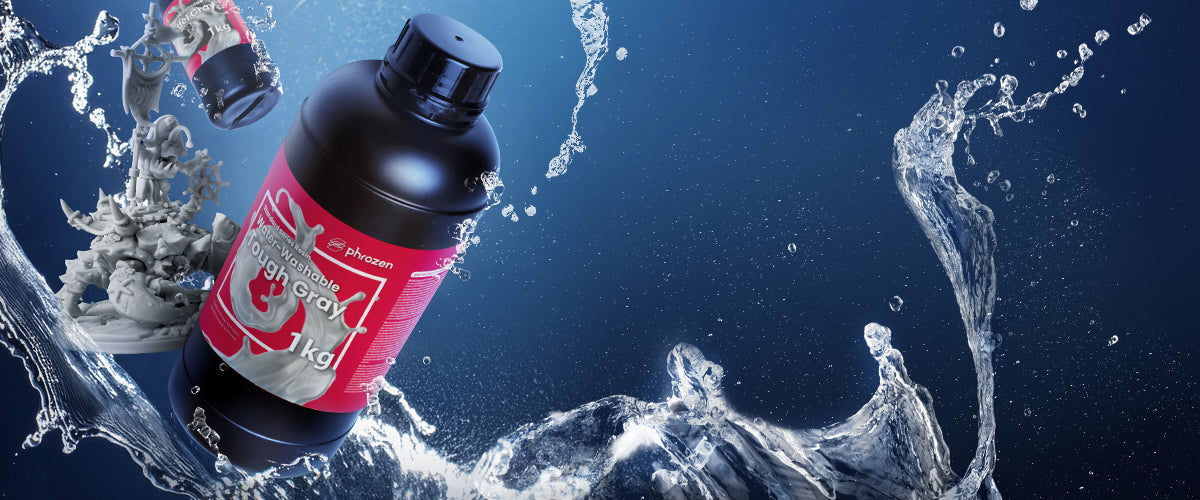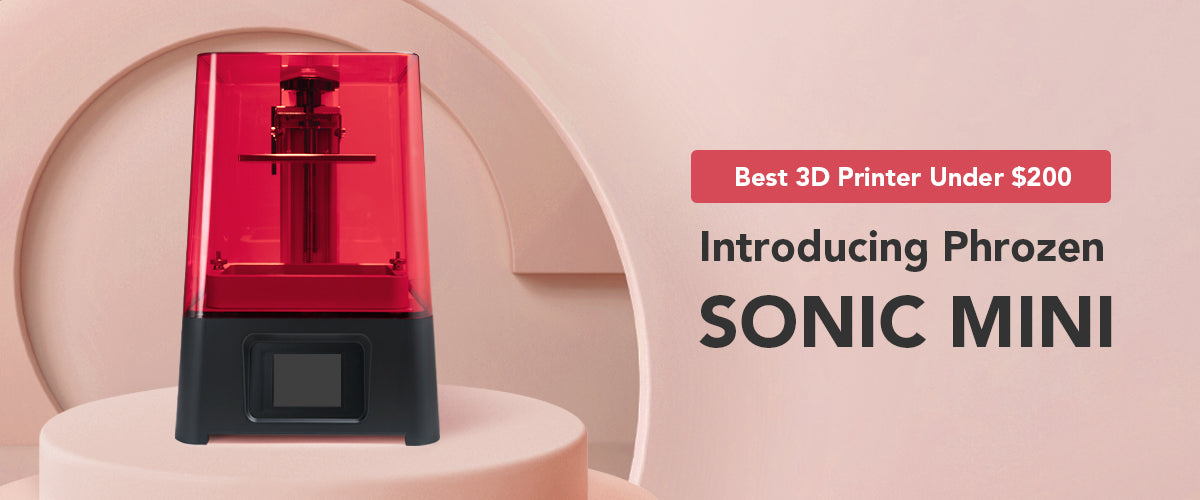We’ve all been there—waiting for hours as our 3D printer works through a large or complex design. Whether you’re excited to finish a new project or racing to meet a deadline, slow print times can be frustrating. But what if you could speed up 3D prints in half without sacrificing quality?
There are many ways for you to fasten your 3D printing process. However, the best and easiest method is to use a high-speed resin.
Enter Phrozen’s Speed Plus Resin. In this blog, we’ll show you how to speed up 3D prints through this advanced resin while maintaining high levels of detail.
Let’s explore how this resin can be a game-changer for your projects, and why you’ll never want to go back to standard printing methods.
Why Do We Need Faster 3D Printing?
It’s not just about impatience—there are many practical reasons why you may need to speed up 3D printing.
First and foremost, time is money. For professionals, every extra hour your printer spends on a project could mean missed deadlines or delayed production schedules. The faster you can print, the more you can accomplish in less time, which directly translates to increased productivity and profitability.
In industries like prototyping, product development, and cosplay, rapid production cycles are essential. Whether it’s creating functional prototypes for product validation or crafting large props for an event, fast turnaround is often critical.
For enthusiasts, speeding up 3D printing means less waiting and more doing—whether it’s completing a large model in time for a deadline or just moving on to your next exciting project.
Speeding up 3D prints doesn’t just save time. It also reduces wear and tear on your 3D printer, since shorter print durations put less strain on your machine’s moving parts and release film. In the long run, this means fewer breakdowns, lower maintenance costs, and a longer lifespan for your printer.
The Speed Plus Resin Advantage: 50% Faster, Better Results
So how exactly does Phrozen’s Speed Plus Resin help you achieve faster results without compromising on detail? Let’s break it down:
Speed Plus Resin is engineered specifically for fast printing, with an exposure time of just 1.5 seconds per layer at a 0.1 mm layer height.

Speed Plus resin reduces printing time by 50%.
This enables you to print large models in record time—what might typically take 10 to 12 hours with a standard resin can now be completed in just over 5 hours.
But speed alone isn’t enough. The real innovation of Speed Plus Resin lies in its ability to maintain fine details even when printing at higher speeds.

Extraordinary details printed with the Speed Plus Resin.
Unlike other high-speed resins that sacrifice precision for speed, Speed Plus Resin ensures you don’t have to compromise. Your models will still look sharp and detailed, even with thicker layers.

Speed Plus resin possesses a low viscosity for a seamless printing process.
The resin also boasts a low viscosity of 150 cP, which makes the printing process smoother and more stable. This reduces the risk of print failures, resulting in more consistent outcomes across larger prints.
Whether you're working on cosplay props, large terrains, or big functional prototypes, Speed Plus Resin enables you to finish your projects faster and with the same level of precision.
How Speed Plus Resin Optimizes Your Workflow
Using Speed Plus Resin isn’t just about cutting print times—it’s about improving your entire 3D printing workflow. Here’s how it helps:
When paired with the right printer, like the Sonic Mega 8K S, Speed Plus Resin makes the entire process more efficient. The fast exposure time allows for shorter print cycles, which means you can take on more projects without worrying about long wait times. Additionally, its ability to print at 0.1 mm layer heights without losing detail means you can balance speed and quality, no matter the size of your model.
Moreover, this resin’s super-low viscosity ensures fewer issues during the printing process. The resin flows smoothly and cures quickly, resulting in less risk of print failures and smoother, cleaner prints. This saves you from wasting both time and material, allowing for a more reliable printing experience overall.
Why You Should Choose Sonic Mega 8K S & Mega 8K V2
If you want to fully harness the speed and efficiency of Speed Plus Resin, pairing it with a high-performance printer is essential. That’s where Phrozen’s Sonic Mega 8K S and Sonic Mega 8K V2 come in.
The Sonic Mega 8K S is designed with speed in mind, featuring a 15-inch build plate and advanced ACF film that reduce print times even further. You can print multiple models in one go or finish larger models faster than ever. It’s perfect for professionals who need to mass-produce miniatures or larger models in record time.
On the other hand, the Sonic Mega 8K V2 takes things a step further. With an XY resolution of 43µm and the ability to handle faster print settings, this printer is ideal for large-scale models that require both speed and precision. It’s a top choice for anyone who wants the best of both worlds—high-quality detail at incredible speed.
Other Methods to Speed Up Your 3D Prints
While using Speed Plus Resin with a fast printer is a great way to improve print speeds, there are additional methods you can use to speed up 3D printing. Here are a few tips:
- Optimize Your Slicer Settings: Adjusting your slicer settings can greatly impact print times. For instance, increasing your layer height or print speed can shave hours off a large print. You can also reduce infill density or switch to faster infill patterns to reduce material use and time.
- Use Larger Nozzles: If you’re using an FDM printer, consider using a larger nozzle. A larger nozzle extrudes more material per layer, which means fewer layers are required to complete a print.
- Reduce Supports: Supports can significantly extend print times, so optimizing your model’s orientation to minimize the need for supports will help speed things up. You can also experiment with tree supports, which are designed to be faster to print and easier to remove.
If you want to know other methods to speed up your 3D prints, check out our blog on 3D Printing Faster: Proven Techniques. It covers everything from layer height to nozzle size and beyond to maximize your printing speed. Use these methods in conjunction with the Speed Plus resin, and you’ll be getting super fast results.
Moreover, if need some ideas for 3D printing, you must check out our blog on cool 3D prints. It has the most awesome and stunning 3D models for your 3D printing projects.
Conclusion: Faster Prints, Same High Quality
Speeding up your 3D prints doesn’t mean sacrificing quality, and Phrozen’s Speed Plus Resin proves that. By reducing print times and maintaining excellent detail, this resin is the perfect solution for hobbyists and professionals alike who want to get more done in less time. Whether you’re working on large-scale models, cosplay props, or prototypes, Speed Plus Resin helps you achieve faster, more reliable results.
Pair it with Phrozen’s Sonic Mega 8K S or Sonic Mega 8K V2 printers for the ultimate speed and precision combo. And don’t forget to explore additional techniques like optimizing slicer settings and using larger nozzles to make the most of your 3D printing setup.
How to Speed Up 3d Prints FAQ
1. How can I make my 3D printer faster?
There are several ways to increase the speed of your 3D printer. One of the most effective methods is to use high-speed resin, such as Phrozen's Speed Plus Resin, which can significantly reduce print times while maintaining quality.
You can also optimize your slicer settings by adjusting parameters like layer height, print speed, and infill density. Upgrading your hardware by pairing high-speed resin with a high-performance printer like the Sonic Mega 8K S or Sonic Mega 8K V2 will further enhance efficiency. Another option is to use larger nozzles on FDM printers, reducing the number of layers required and speeding up the overall print process.
2. How do I make my 3D prints faster?
To make your 3D prints faster, you can start by using faster materials like high-speed resin, which cuts down on print times. You can also modify your print settings to increase the layer height, reduce the amount of infill, and minimize the need for supports. Additionally, adjusting the orientation of your model to reduce the number of layers and supports required will further speed up the process.
3. How do I speed up my 3D printer without sacrificing quality?
You can speed up your 3D printer without sacrificing quality by using specialized resins like Phrozen's Speed Plus Resin, which allows for faster prints while maintaining excellent detail.
Another way to maintain quality while speeding up is by finding the right balance between thicker layers for speed and thinner layers for finer detail. Pairing your resin with a fast, high-quality printer like Phrozen's Sonic Mega 8K S is also essential to achieving high speeds without compromising on resolution.
4. How fast does a 3D printer typically print?
The speed of a 3D printer varies depending on the technology and materials used. For example, resin printers can print layers in as little as 1-2 seconds per layer, while FDM printers generally print slower, with speeds ranging from 50 to 150 millimeters per second, depending on the complexity of the model and the printer’s capabilities.
5. How fast is a 3D printer with high-speed resin?
With a high-speed resin like Phrozen's Speed Plus Resin, you can reduce print times by up to 50%. For instance, a large model that would typically take 10 to 12 hours to print can be completed in just over 5 hours, depending on the size and detail of the model.
6. How do I make my 3D printer print faster?
To make your 3D printer print faster, start by using faster materials such as high-speed resins or filaments. Adjust your slicer settings to increase print speed, layer height, and reduce the amount of infill. Upgrading to a high-performance printer, such as those in the Sonic Mega 8K series, will also significantly increase print speeds while maintaining quality.
7. How fast can a 3D printer print with optimized settings?
With optimized settings, resin printers can achieve layer exposure times as low as 1.5 seconds per layer. On the other hand, FDM printers, depending on the material and complexity of the model, can reach print speeds of 100 to 200 millimeters per second, allowing for faster production of larger models.
8. How can I make my printer print faster?
If you want to speed up your printer, particularly FDM models, you can switch to a larger nozzle size, which will extrude more material per layer, reducing the overall layer count. For resin printers, using a fast-curing resin like Speed Plus Resin with a printer designed for speed, such as the Sonic Mega 8K S, will result in much faster print times without compromising quality.
9. How fast are 3D printers compared to standard printing methods?
Compared to standard printing methods, 3D printers can take several hours to complete a project. However, by using high-speed materials like Phrozen’s Speed Plus Resin and pairing them with fast printers, such as the Sonic Mega 8K series, print times can be cut by half. This allows for much faster production cycles while maintaining the level of detail and quality you expect from 3D printing.
10. Why is my 3D printer taking so long to print?
There are a number of reasons why your 3D printer might be taking a long time to complete a project. Factors such as low layer height settings, which are used for higher resolution, or high-density infill and supports can contribute to longer print times.
If you're using a resin printer, long exposure times can also slow down the process. To improve speed, you can adjust these settings, use faster materials like Speed Plus Resin, or consider upgrading to a high-performance printer to reduce print durations while maintaining quality.

